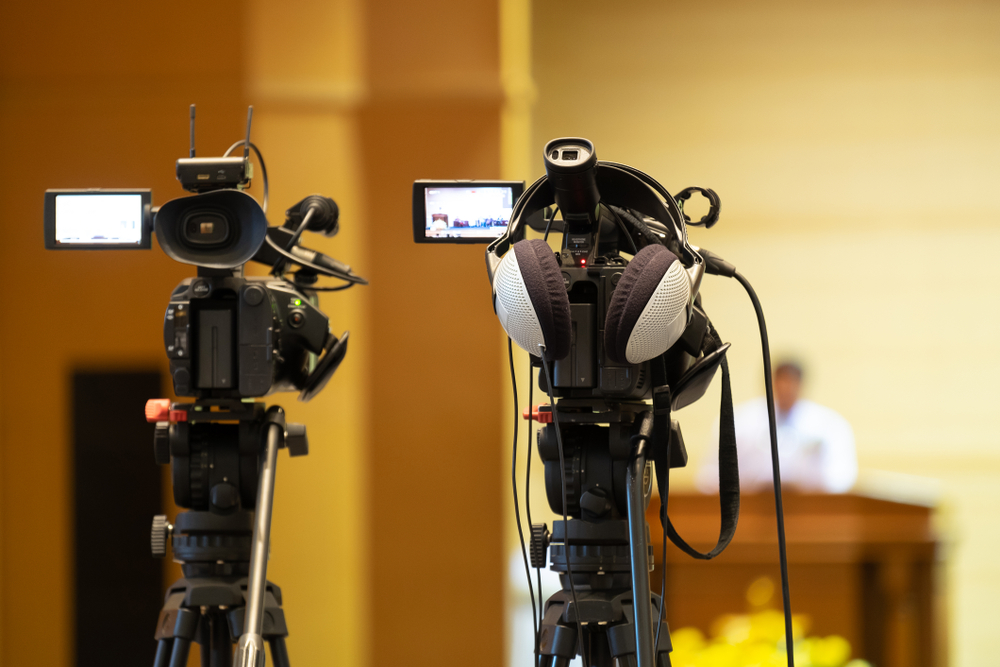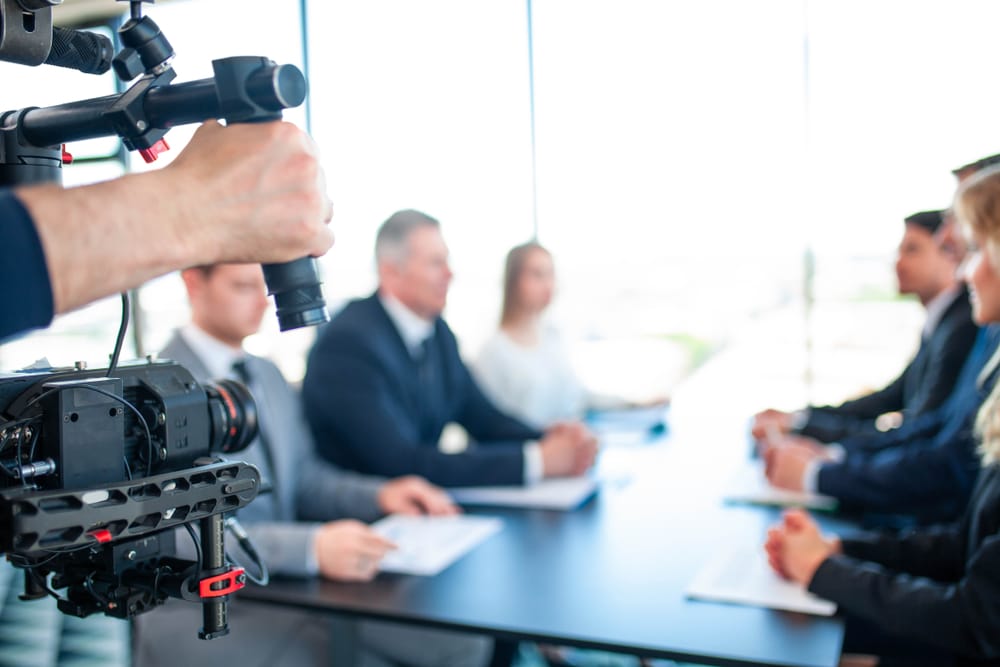The Value of Legal Video Clip Depositions in Modern Legal Services: What You Ought to Know
Legal video depositions have become vital in today's legal landscape. They offer a multidimensional sight of witness statements that conventional records simply can not match. By capturing both spoken and non-verbal communication, these depositions enhance the general understanding of a witness's reputation. The performance of video clip depositions hinges on numerous elements, consisting of compliance with legal standards and finest techniques. Checking out these elements reveals their real relevance in modern legal services
What Are Lawful Video Clip Depositions?
Legal video clip depositions work as a crucial tool in the lawsuits process. They include recording witness testimonies in a video clip style, catching both non-verbal and spoken interaction. This approach permits attorneys to document the demeanor, expressions, and reactions of witnesses, supplying a richer context for the testimony. Usually carried out in a controlled setting, these depositions are led by attorneys who ask concerns while a court reporter records the dialogue. The resulting video clip can be important for test preparation, as it enables lawyers to assess the reputation of witnesses and fine-tune their approaches. In addition, legal video depositions can be utilized in various legal contexts, varying from civil disagreements to criminal cases. The acoustic and visual aspects of video depositions improve the presentation of evidence, making it an essential component in the contemporary legal landscape. On the whole, they contribute substantially to the efficiency and effectiveness of lawful proceedings.

Benefits of Video Depositions Over Traditional Methods
Video clip depositions offer various advantages contrasted to conventional approaches of taking witness testaments. One significant advantage is the capability to capture both audio and visual elements, providing an extra comprehensive record of the witness's declarations. This double format boosts quality and enables legal experts to reference certain nuances during trial preparation. In addition, video depositions help with remote engagement, making it simpler for witnesses who might be inaccessible for in-person appearances because of geographical constraints or health issues.Moreover, video clip depositions can speed up the overall deposition process, minimizing the time and prices connected with travel and logistics. They likewise boost availability, as tape-recorded depositions can be conveniently shared amongst legal groups and referenced at any moment. This ease adds to much better case monitoring and prep work. Overall, video clip depositions represent a modern, effective approach to collecting witness testaments, aligning with the evolving requirements of the legal occupation.
The Role of Body Movement and Tone in Testimonies

In lawful video depositions, body movement and tone play vital duties in communicating a witness's reliability and trustworthiness. Nonverbal cues can offer understandings right into a witness's mood, influencing exactly how their testament is regarded. Understanding the effect of these aspects is essential for lawyers and jurors alike when reviewing the reliability of a testimony.
Nonverbal Communication Insights
While verbal communication is typically stressed in legal statements, nonverbal cues such as body language and tone play a vital function in communicating reputation and feeling. Viewers of depositions may keep in mind that a witness's stance, gestures, and faces can significantly influence perceptions of reliability. Consistent eye call might signal confidence, while staying clear of stare can recommend dishonesty or discomfort. The tone of voice-- its quantity, speed, and pitch-- can present feelings of genuineness or unpredictability. Lawful specialists must be in harmony with these nonverbal signals, as they typically offer critical context that enhances spoken words. Recognizing these subtleties can boost the performance of depositions and influence the outcome of legal process.
Emotional Tone Influence
The emotional tone conveyed during legal testaments substantially influences exactly how a witness is regarded. Body language, singing inflections, and face expressions play vital roles fit the story of a statement. A witness exhibiting confidence through consistent eye contact and a tranquil tone can instill a feeling of dependability and interaction. Alternatively, signs of anxiety, such as fidgeting or an unstable voice, may cause suspicion concerning their account. The subtleties of psychological expression can influence the analysis of realities, making it necessary for lawyers to recognize these signs. In video depositions, the auditory and aesthetic components integrate, emphasizing the significance of emotional tone in communicating genuineness and reliability within the legal procedure.
Trustworthiness and Trustworthiness
A crucial consider establishing reputation and credibility throughout statements lies in the witness's body movement and tone of voice. Onlookers frequently rely upon non-verbal cues-- such as eye call, posture, and gestures-- to evaluate a witness's sincerity. As an example, a witness who preserves eye contact and shows open body movement may be perceived as more trusted and sincere than one that avoids eye get in touch with or shows up closed off. Additionally, tone of voice plays a crucial duty; a steady, calm tone can strengthen the reliability of the testimony, while fluctuations in pitch or quantity might raise questions. Ultimately, the mix of body movement and singing tone greatly affects exactly how a witness's statements are received and analyzed in a legal context.
Best Practices for Performing Video Depositions
Conducting video clip depositions needs careful preparation and implementation to guarantee a efficient and clear presentation of testament. First, it is essential to pick a peaceful, well-lit location to lessen interruptions and safe ideal video quality. The equipment needs to be checked in advancement, consisting of video cameras, microphones, and lights, to prevent technological issues throughout the deposition.Next, celebrations included must examine the style and treatments in advance, seeing to it that everybody understands their duties. The deponent must be briefed on the procedure, including exactly how to respond clearly and concisely.Additionally, keeping a professional temperament throughout the session is crucial. This consists of abstaining from speaking over each other and verifying that all inquiries are guided suitably. Finally, it is vital to record the deposition in a style that enables very easy playback and evaluation, protecting the honesty of the testimony for future use.
Legal Considerations and Compliance Issues
How do legal considerations and compliance issues impact the effectiveness of video depositions? Legal experts need to browse a complicated landscape of regulations, ensuring that video depositions stick to jurisdictional rules and standards. Compliance with laws concerning personal privacy, consent, and taping approaches is crucial. Obtaining specific get redirected here approval from all celebrations involved is necessary to stay clear of legal repercussions.Additionally, the admissibility of video clip proof in court can hinge on compliance with procedural requirements. Making certain that the devices made use of fulfills technological criteria is also essential, as low quality can threaten the deposition's reliability.Moreover, attorneys must be mindful of any kind of details state regulations that govern video clip depositions, as these can vary significantly. Failure to deal with these factors to consider can not only endanger the integrity of the deposition yet also influence the overall instance technique, ultimately impacting the customer's legal end results.
Exactly How Video Clip Depositions Influence Jury Assumption
While video clip depositions can act as effective tools in lawful process, their influence on jury assumption is considerable. The aesthetic and acoustic elements of video clip recordings supply jurors with a more detailed understanding of witness behavior, trustworthiness, and psychological reactions. This multimedia method can boost the jurors' capability to analyze the integrity of testimony compared to standard text-based transcripts.Moreover, video depositions enable jurors to observe body language, intonation, and faces, every one of which can impact their interpretation of the witness's declarations. The visibility of a witness on display can humanize them, cultivating compassion and connection, which might sway jurors' point of views. Conversely, a witness who appears unreliable or evasive on video may bring about adverse assumptions that affect a court's choice. Ultimately, the vibrant nature of video depositions plays a vital duty in shaping just how jurors translate evidence and reach their verdicts.
The Future of Video Depositions in Legal Method
As innovations in innovation continue to reshape the lawful landscape, the future of video depositions is poised for significant development. Developments such as artificial knowledge, virtual truth, and improved video clip conferencing devices are expected to enhance the deposition procedure and enhance availability. Attorneys may make use of AI-driven analytics to analyze witness trustworthiness and instance toughness more effectively.Moreover, the integration of digital reality might enable juries to experience immersive simulations of depositions, providing deeper context and understanding. Additionally, the fad toward remote depositions is most likely to continue, offering better flexibility for attorneys and customers alike.As remote job comes to be increasingly normalized, video clip depositions will likely become standard technique, decreasing expenses and time restraints connected with conventional techniques. On the whole, these technological improvements guarantee to enhance the efficiency, effectiveness, and access of video depositions in legal technique, eventually transforming exactly how lawyers get ready for test.
Often Asked Concerns
Just How Much Do Legal Video Clip Depositions Normally Cost?

Can Video Depositions Be Made Use Of in Any Sort Of Situation?
Video depositions can be used important link in different kinds of cases, including civil, criminal, and household legislation. Their versatility permits attorneys to present witness testimonies properly, adapting to the specific demands of various legal circumstances.
What Equipment Is Required for a Video Deposition?
To perform a video clip deposition, vital devices consists of a premium camera, microphone, lights, and a dependable recording device. Additionally, a computer with editing and enhancing software may be required for post-production and formatting the last video clip.
How Long Does a Normal Video Clip Deposition Last?
A common video clip deposition lasts in between two to four hours, relying on the intricacy of the instance and the variety of questions positioned. Prolonged sessions might occur, but breaks are normally incorporated for participant convenience.

Are Video Clip Depositions Admissible in Court?
Video clip depositions are generally admissible in court, provided they adhere to legal criteria and rules of evidence. Their usage boosts clarity and protects witness statement, helping in the judicial process read the article during tests and hearings. Legal video depositions have actually ended up being important in today's lawful landscape. Furthermore, legal video depositions can be utilized in different legal contexts, varying from civil disagreements to criminal instances. Additionally, video depositions assist in remote participation, making it less complicated for witnesses who might be inaccessible for in-person looks due to geographical constraints or health and wellness issues.Moreover, video clip depositions can speed up the general deposition process, minimizing the time and costs linked with traveling and logistics. Ensuring that the equipment used meets technological standards is also important, as poor top quality can weaken the deposition's reliability.Moreover, lawyers should be mindful of any certain state regulations that control video clip depositions, as these can differ substantially. Furthermore, the trend toward remote depositions is likely to continue, using higher versatility for attorneys and clients alike.As remote work becomes increasingly stabilized, video depositions will likely become basic practice, reducing expenses and time restraints linked with conventional methods.
Comments on “How to avoid common mistakes during legal video depositions”